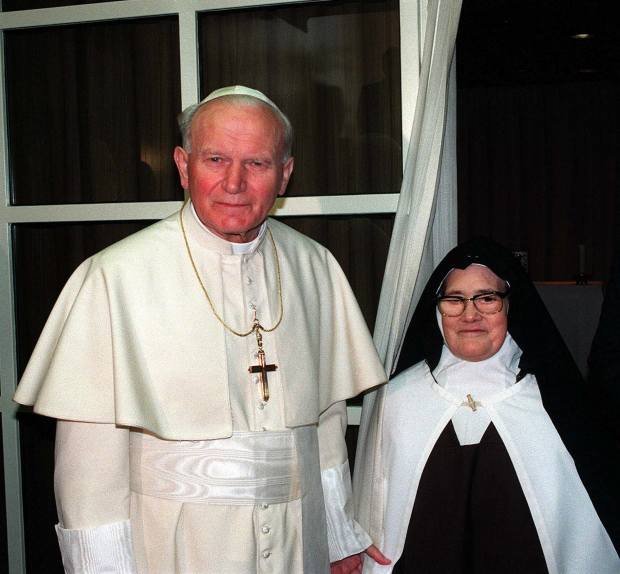Lenten Campaign 2025
This content is free of charge, as are all our articles.
Support us with a donation that is tax-deductible and enable us to continue to reach millions of readers.
"Even if I come in a wheelchair, I'm coming," Pope Francis told World Youth Day organizers, according to Bishop José Ornelas Carvalho of Leiria-Fatima. Given the 86-year-old Pope's mobility difficulties, the journey from Lisbon, where the WYD will be held, to Fatima — some 80 miles — could be made by helicopter, the bishop said. The Holy See has not yet confirmed this proposal.
This will be Pope Francis' second visit to the Portuguese Marian shrine since his election. The previous occasion was his apostolic journey on May 12-13, 2017, to mark the centenary of the apparitions of the Virgin Mary to the three little shepherds: Lucia Santos and Francisco and Jacinta Marto, and to canonize the latter two.

In fact, the Argentine pontiff has forged a special bond with Fatima. At his request, on May 13, 2013, the then Patriarch of Lisbon, Cardinal José Policarpo, presided over a pontifical consecration to the Virgin Mary there. Then on April 25, 2018, during a general audience, Francis blessed and crowned a statue of the Virgin of Fatima destined for an Italian parish.
Then, most notably, a month after the outbreak of war in Ukraine, the Argentine Pontiff decided to consecrate Russia and Ukraine to the Immaculate Heart of Mary — following the famous "second secret" of Fatima — during a penitential celebration on March 25, 2022 in St. Peter's Basilica. The same consecration was performed simultaneously on the same day at the Fatima shrine by Apostolic Almoner Cardinal Konrad Krajewski.
Popes visit Fatima
Before Francis, three pontiffs have visited Cova da Iria. The first, Paul VI, visited on May 13 1967, to mark the 50th anniversary of the apparitions officially recognized by the Catholic Church in 1930. He presented a golden rose to Our Lady of the Rosary.
John Paul II visited Fatima three times (1982, 1991, and 2000). He took a special interest in the Portuguese shrine after he narrowly escaped an assassination attempt in St. Peter's Square on May 13, 1981, the feast day of Our Lady of Fatima.
The Polish Pope, struck by the coincidence of dates, saw it as a sign that the Virgin Mary had deflected the fatal bullet fired by a hired assassin. The following year, on May 13 1982, he personally visited Fatima to express his gratitude to the Mother of God. John Paul II returned nine years later, on May 12 and 13, 1991; then on May 12 and 13, 2000, to celebrate the beatification of the three visionaries.

Finally, his successor Benedict XVI visited Fatima in May 2010, for the 10th anniversary of the beatification of the little shepherds. But even before his election, as Cardinal Joseph Ratzinger, Prefect of the Congregation for the Doctrine of the Faith, it was he who was commissioned by Pope John Paul II to make public the third and final secret of the Fatima apparitions on the occasion of the Great Jubilee of the Year 2000.
Popes and the secrets of Fatima
The special link between the Portuguese shrine and the See of Peter is partly explained by the history of the popes and the famous “Secrets of Fatima.” The Virgin Mary revealed these three secrets to the shepherd children. The first was a vision of what hell was like; the second, a request to consecrate Russia to her Immaculate Heart; the third an apocalyptic scene depicting, among other things, the pope in a ruined city.
In the second “secret,” which describes a new war worse than the First World War, the Virgin Mary asks that Russia be consecrated to prevent it from spreading “its errors throughout the world” and destroying nations. “If my requests are accepted,” said the Mother of God, “Russia will be converted and there will be peace.”
On hearing this warning, Pius XII took it seriously. On October 31, 1942, in the midst of the Second World War, he consecrated the world to the Immaculate Heart of Mary — but without mentioning Russia by name. Ten years later, on July 7, 1952, he renewed the consecration in an apostolic letter, this time mentioning “all the peoples of Russia.”
After his election, Paul VI was asked by bishops to proceed with a new consecration of Russia during the Cold War, which he did on November 21, 1964. In the same spirit, John Paul II presided over an "act of consecration" of the world on June 7, 1981 in Rome, which he renewed on May 13, 1982, in Fatima, and on March 25, 1984, in St. Peter's Square, in union with all the world's bishops.
The "third secret," which has caused much ink to flow, deals with the persecution of the Church and Peter's Successor. It was eventually revealed at the request of John Paul II, on June 26, 2000. It was Cardinal Joseph Ratzinger who made the announcement, accompanied by a theological commentary. The German prefect explained, among other things, that this was not a pessimistic omen about the future, but rather an invitation to "mobilize the forces of change in the right direction."
Even after his resignation, Benedict XVI had to revisit this secret of which he was the emissary. In a March 15, 2016, letter to historian Yves Chiron, transcribed in his book Fatima Vérités et légendes (2017), the then pontiff emeritus certified, with reference to allegations circulating among certain Catholic groups, "that a fourth secret of Fatima does not exist."











